Spring 2015
Inside this issue
Featured
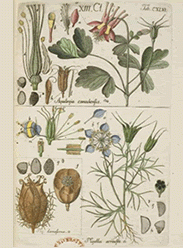
Botanical Handbook by Christian Schkuhr
From the Director's Chair: The UCL Family of Libraries - A European Experience
On Monday 16 March 2015, UCL Library Services held a party in the renowned Flaxman Gallery in the Wilkins Building to welcome the Newsam Library and Archives, UCL Institute of Education, into the UCL family of libraries. This brings to 18 the number of members in the UCL family of libraries, which stretches geographically as far as Qatar.
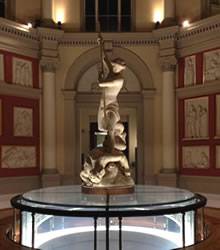
16 March was a very special occasion as the UCL Institute of Education Library is a collection and service of national importance for the support of education as an academic subject. The inclusion of the UCL Institute of Education into UCL has made this university predominantly a postgraduate institution. The welcome party in the Flaxman Gallery was graced by speeches from Professor David Price, Chair of UCL Library Committee, and Professor Chris Husbands, Director of the UCL Institute of Education.
Professor Price formally welcomed the UCL Institute of Education Library and Archive into the UCL family of libraries. Professor Chris Husbands noted that it was inconceivable that any institution of Higher Education, with an emphasis on research, could fail to have a well-resourced library service. As Director of UCL Library Services, I emphasised the unique nature of the educational and research offering that UCL Library Services has to make. With a UCL ID card, and the IT credentials which lie behind it, UCL staff and students have access to all 18 libraries in the UCL family. And what an experience that is. Scoring well over 90% in the SB/ISB surveys, UCL has one of the best digital libraries in the Russell Group. And, once UCL staff and students have a UCL ID card with library barcode attached, they have access to one of the best learning and research experiences in Europe - because everybody has access to everything.
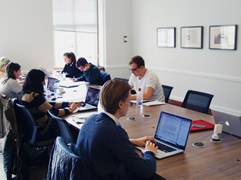
Senate House Hub
As well as running 18 libraries, UCL Library Services also manages all centrally-provided learning spaces in UCL. The latest addition to this family of learning spaces is the UCL Senate House Hub on the 3rd floor of the South Block of Senate House (more on the hub below). This comprises 144 top-quality, digitally-enabled learning spaces for UCL students who want to use high-spec. facilities. There are no books and journals in the Hub. All the resources available in the Hub are delivered electronically. However, paper copy is at hand for those who want to use it. UCL buys full access for UCL staff and students to the Senate House Library, which has rich current collections in the Arts and Humanities. The UCL Senate House Hub is already being heavily used by UCL students. This is a dedicated space solely for UCL users. It constitutes a major addition to the study facilities which UCL has to offer.
The UCL family of libraries represents one of the greatest concentrations of library and study facilities anywhere in Europe. The richness of collections, the excellence of service provision and the diversity of the learning spaces which UCL can provide underlines that this University is re-defining what learning, study and research support from the University Library looks like.
by Paul Ayris, Director of UCL Library Services
Spotlight on UCL Institute of Education Library
The Institute of Education was founded in 1902, as the London Day Training College. It occupied premises in Southampton Row, and these included a Library. The first Librarian, Miss Geraldine de Montmorency, was appointed in 1925. In 1932 the Institute became part of the University of London and subsequently moved to occupy rooms in the North wing of Senate House.
Douglas Foskett succeeded Miss de Montmorency as Librarian in 1957. By this time the Library had outgrown space in Senate House, and in 1958 it moved to new 'temporary' premises in a large hut, next door to Senate House, and originally built in 1918 to house Belgian refugees. By 1969 plans for the new building at Bedford Way designed by Denys Lasdun, including a Library wing, were well under way. Meanwhile, the Library moved to another temporary space at 11-13 Ridgmount Street where it was to remain until 1991.
When the new Institute building at 20 Bedford Way opened in 1975 it was only partially completed and the Library was one aspect which was dropped from Lasdun's original design. Under the leadership of Sir Peter Newsam the Institute finally succeeded in building an extension to its Bedford Way building to house the Library and this opened in 1993.
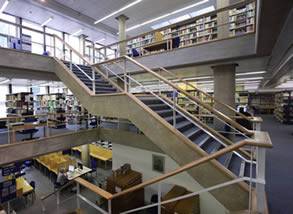
On 2nd December 2014 the Institute of Education became the latest addition to the UCL family of libraries.
The Library is on three levels. The main entrance leads to Level 4 which is used for collaborative working and contains two bookable Group Study Rooms plus three PC Labs which are used for IT training and private study. Our Archives Office/Reading Room is also located here along with the Library Teaching Room which is used for Information Literacy training as well as staff meetings and training sessions.
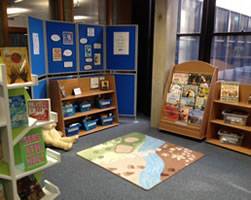
On Level 4 you will find various collections, including our Curriculum Resources collection which is a collection of teaching material (fiction and non-fiction) used by trainee teachers in the classroom. Also located here is our new Children's Book Corner, a model of good practice as an example of how teachers and schools can best use their space and resources to promote literacy in the curriculum and reading for pleasure.
Level 5 is home to the Main Education collection, Europe's largest collection of education books. We try to acquire a copy of every book on education published in the UK. It is classified using our own unique classification scheme devised especially to accommodate a single subject collection of such depth and breadth.
Level 3 is home to our International and Comparative collection, plus our Non-Education collection which is basically other subjects - mainly material that turns up on reading lists - it covers other social science subjects, plus Philosophy, Religion, Art etc.
We have a number of Library and Archive stacks holding material from our Special Collections and Archives, plus relegated stock from the open access collections. The vast majority of our material is available for use by researchers on request and we attract 3,000 visitors every year interested in our unique collection. Access is a central principle of the UCL IOE Library - we are committed to the principle that if material is not available for use wherever possible, we are not fulfilling our mission as an institutional and national collection.
There are 46 staff working at the UCL IOE Library and this year we were awarded the Director's Prize in recognition of our "exceptional and sustained contribution to supporting 'excellence' in the Institute". We have also been shortlisted in the Outstanding Library Team category of the Times Higher Education Leadership and Management Awards for an unprecedented two years in a row.
Archives have just been awarded 'Accredited' status by The National Archives, the first HE library in London and one of only a handful of academic institutions in the UK to be recognised in this way. Impressed by our 'strong management and planning' and 'excellent documentation' the citation highlighted our 'achievements and innovative good practice in many areas, specifically developing outreach, broadening the volunteering offer and tackling digital preservation issues which many larger and better-resourced services have struggled to address'.
For further information on our specialist services and collections please see our LibGuides.
by Peter Dennison, Head of User Services, and Rozz Evans, Head of Collections, UCL Institute of Education Library
Queen of the Sciences: A Celebration of Numbers and the London Mathematical Society
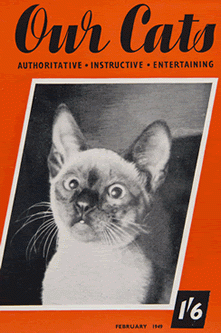
The London Mathematical Society's Library and Archive has been held by Special Collections since 1929, and comprises several thousand volumes as well as correspondence and a curiosity, the 'Receptacle' of the former Spitalfields Mathematical Society, a predecessor of the Society that became the LMS. Presented by Joseph Steevens in 1813, the Receptacle is a scrapbook of drawings, designs and plans - including one of the Society's rooms in Crispin Street - as well as tickets and notices for their meetings. Items from the Receptacle, letters and photographs of the first nine Presidents of the LMS are on display in the two table cases in our exhibition.
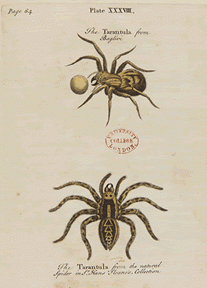
Inspired by the anniversary and connecting with it, the main case expands the mathematical theme with materials from Special Collections that represent the numbers one to nine. A student's notebook of Augustus de Morgan's lectures, Sophia de Morgan's sketch of the LMS logo and illustrations from An Appendix to the Elements of Euclid are here alongside apiarist Charles Butler's seventeenth century Feminine Monarchie and its musical score, Quartet of Bees. The number six is represented by George Orwell's six novels while Eleazor Albin's A Natural History of Spiders and Other Curious Insects occupies shelf number eight side-by-side with Erica Van Horn and Simon Cutts 8 old Irish apples and 8 old Irish potatoes from the Poetry Store.
We are very pleased to be collaborating with the London Mathematical Society in curating this exhibition which runs until December 2015.
Musical score
Musical readers (or non) may wish to download the musical score for Quartet of Bees.
by Kate Cheney, Chair of Exhibitions Committee
Smoke Gets in Your Eyes
James the First of England is famous for his hatred of tobacco smoke and he was the first person to tax the weed. When it came to smokers in Russia the Tsar had first offenders whipped and second offenders hung. He didn't like snuff-takers either: they had their noses cut off. At one time some women believed that smoking a pipe would prevent their husbands from committing adultery and monks advised people to smoke to help them become more chaste.
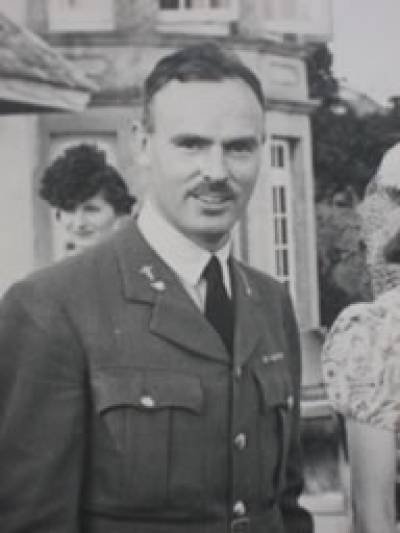
James H. Doggart. Image by Oxford2008, Wikipedia
In 1959 (the same decade that Richard Doll established the link between cigarette smoke and lung cancer) James H. Doggart1 of the Institute of Ophthalmology, who was also a consultant at the Moorfields and Great Ormond Street Hospitals, wrote an article entitled Smoking as a factor in visual disturbance in which he equates the effects of nicotine with those of curare, famous for killing you instantly when fired at you on the tip of a South American arrow. Doggart writes that the only known carcinogenic substance in tobacco in his time was arsenic. In the sixteenth century tobacco leaves were used as a "remedy" for cancer and as a prophylactic against the plague. Schoolboys at Eton were taught how to smoke to ward it off and one who refused to learn was flogged. Jean Nicot, the French Ambassador to Lisbon from 1559 to 1561, also recommended tobacco leaves for their medicinal properties and it is from his name that we get the word nicotine.
Doggart tells us that, in Australia in 1897, some horses went blind after eating a local variety of the tobacco plant Nicotiana suaveolens. Eye problems happen to nicotine addicted humans too: according to Doggart conjunctivitis is common among smokers and so too is toxic amblyopia, a disorder of the optic nerve caused by tobacco. One of his patients developed a recurrent corneal abrasion after jabbing his eye with the lighted end of a cigarette when the other end of it had stuck to his lips but that was just bad luck (or plain idiocy!). Another smoker coughed so hard that he managed to detach his retina. Nicotine also causes thromboangiitis obliterans for which there is no known cure.
Doggart's articles are collected together with those of many other luminaries of the Institute as part of the Ophthalmology Historical Collection in The Joint Library of Ophthalmology, Moorfields Eye Hospital & UCL Institute of Ophthalmology.
by Bill Lehm, Cataloguer
1Further research has uncovered the fact that James Doggart corresponded with the Slade's Dora Carrington for a number of years (Ed.)
Profile: Sandra Bamborough, ReadingLists @ UCL Advocacy, TLSS
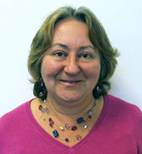
I joined UCL Library Services in May last year to promote and drive an increased take-up by all academic staff in the use of our online reading lists service, ReadingLists@UCL. I am one of the Teaching & Learning Support Section team, with my role focusing on promoting ReadingLists@UCL. So far uptake across academic departments has increased from 22% when I started, to 38% and obviously we want to continue building on that! My immediate background before joining UCL was as a chartered librarian working at Amnesty International, where I implemented various systems in the UK and remotely overseas. Prior to that I worked in various library roles in broadcasting, most recently at ITV Breakfast (formerly GMTV) as their Library Sales Manager. This included responsibility for marketing the programming and selling clips to international markets. This has proved very helpful in my current role.
I had not worked in an academic library for a considerable number of years and came here new to online reading lists. That was a big advantage though, as I saw with fresh eyes what useful and powerful tools they can be for students, lecturers and library staff. I have found it a pleasure to be able to embrace and genuinely promote this tool to improve the learning experience for our students. It is also very satisfying to be able to help re-invigorate the project; this has relied heavily on working closely with the Subject and Site Librarians to help deliver and disseminate the message to academics.
Persuading users and departments is challenging but rewarding work, which essentially involves explaining and introducing the advantages of the system then following up with individual training sessions. Methods of engagement have included presentations at departmental meetings, attending key committee meetings and showing teaching staff how to engage with and use the system. My focus has also been on training Departmental Administrators and Learning Technologists as they often manage reading lists for their departments. I use social media such as our blog posts and @UCLLibraries Twitter feed, and we recently created some new marketing postcards.
ReadingLists @ UCL had a stall at the recent UCLU Education Conference, for which we created special posters and where we engaged with the StARs. My colleague Pam Clarke and I also shared the library stand at the Well Fair for students, and at the Provost's Welcome. We have reviewed and updated our website, though this is a work in progress as we create new FAQs and online training materials to keep the pages current, engaging and interesting. Watch out soon for our 'how to' screencast guides!
We have just moved into Senate House, right next to UCL's brilliant new student hub, which is already seeing a lot of activity even though it is early days: you can contact us by email.
For more information about ReadingLists @ UCL please:
- Take a look at our support webpages.
- Look at some reading lists.
Queen Square Library Exhibition
A Letter in Mind: a unique art event to celebrate the National Brain Appeal's 30th Anniversary
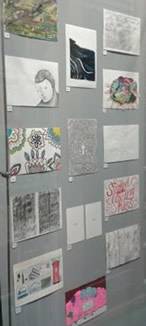
The exhibition showcases over 30 anonymous works, including some by high profile artists and celebrities, selected from those submitted to the National Brain Appeal's "Letter in Mind" appeal.
The selected works will be on display in Queen Square Library until April 2nd.
However, a full online gallery of works will still be available.
All proceeds go directly to the National Brain Appeal - the charity dedicated to raising vital funds for The National Hospital for Neurology and Neurosurgery, Queen Square, London
The "Letter in Mind" concept was so successful that the charity will be running it again later this year
by Sarah Lawson, Librarian, UCL Institute of Neurology, Queen Square Library
UCL Senate House Hub opens for study
An exciting new development in the key performance area of Sustainable Estate has been the opening of UCL Senate House Hub which opened on March 10th to all UCL students and staff.
A new learning space project
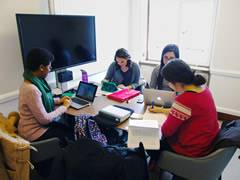
Providing 144 spaces for study the new Hub has been designed by Burwell Deakins architects to create a variety of learning spaces which include study rooms for individual use, collaborative work rooms and group work with sofas equipped with PC and AV.
The new study rooms have been refurbished to deliver a truly inspiring learning environment. The study rooms provide 22 all-in-one PCs and each individual study space has been equipped with desktop power for portable devices. There are a number of print@UCL devices allowing users to print, copy and scan, and Wi-Fi connectivity is available throughout the Hub's learning spaces.
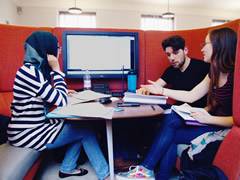
The study rooms have been furnished with high quality desks and chairs to enable students to study comfortably for longer periods and the architecture of Senate House, which is Grade II* listed, provides a refreshing environment for quiet revision and group work.
The Library Services website features the current availability of study spaces in Senate House Hub, supporting students looking for available study space during the busy examination period.
UCL Senate House Hub offers alternative study space for students displaced by some of the construction activities taking place on the campus as part of Transforming UCL.
UCL Library Special Collections
Framed images of UCL Special Collections' treasures, including medieval illuminated manuscripts and items from the George Orwell Archive are displayed on the walls of the Hub. Future exhibitions will also be prepared by students working together with Special Collections staff.
Digital displays where students present Special Collections' treasures are also planned to feature in the new Hub.
By Sarah Custard, Library Buildings Assistant
 Close
Close

